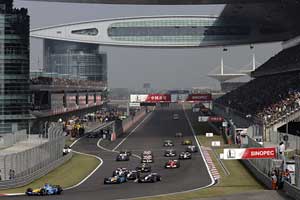FEBRUARY 15, 2006
What if?

The FIA says that Formula 1 budgets need to be cut to around $100m per team in order to preserve the sport and keep the smaller teams in business and paints a picture of a Formula 1 Armaggedon with all the manufacturers pulling out and leaving the industry in ruins. This does not take into account the existence of non-manufacturer money nor the fact that there are always ambitious teams looking for a way into the sport. When the Ford Motor Company decided to quit F1 it sold its Jaguar Racing team to Red Bull and a strong new team was created with much more being invested than was the case when Ford was paying the bills. The same could easily happen with all the other manufacturer teams as there are plenty of large companies in the world that would step in, particularly if F1 was purged of its links with tobacco (which opens the way to the kids market, where motor racing should logically be strong) and its lack of transparency, which frightens big corporations away. The federation says that it can find ways to cut the budgets without ruining the show and that is possibly true but the important question is not about the costs of going racing but rather the elastic nature of research and development budgets. These are uncontrollable as F1 teams will spend as much money as they have available in order to gain an advantage over the opposition. This is, and always has been, the essence of the sport. In previous eras there was room for innovation to gain an advantage but with the progress of technology this is more and more difficult and so the rule-makers have focussed on restricting everything they can. Unfortunately, restriction does not work very well as R&D budgets are simply moved from one area to another. The idea of limiting aerodynamic development to only three updates a year will not, for example, mean that teams spend less time in the windtunnel. It will mean that they will build three cars a year instead of one. Forcing teams to produce fewer parts by increasing the life of the parts is another FIA favourite but this will have other effects which must be considered. Making fewer parts in a year will mean that some of the production staff will no longer have work to do. In addition teams will cease to outsource work which they can do in-house as their production capacity will increase. This would mean that medium and small sub-contractors, which feed Britain's motorsport cluster, would suffer as they would have less work to do. Some of these would go out of business. Money might be saved in Formula 1 but the industry as a whole would have been weakened as there would be less investment in innovation and new technology. In addition the motorsport-trained people are not simply going to sit around being unemployed and will, if necessary, migrate to places where they can find work. This may not seem to be important but the competition that exists from the motorsport cluster around Charlotte in the United States of America could thus gain a dominant role and instead of technology flowing from England's motorsport cluster to America, as was once the case, the technology could start flowing in the opposite direction. That may be an alarmist view but certainly the European motorsport clusters will gain nothing from axes swinging in the F1 world. And where will the F1 industry really benefit from these cuts? The car manufacturers will still have money available to be spent on promotional activities in sport and reducing the spend in F1 will give them the opportunity to increase the spend elsewhere. This could mean the strengthening of rival series, notably NASCAR. Toyota has already shown that it is willing to spend in both F1 and NASCAR, others may follow and that will increase interest in, and the promotion of, NASCAR. The need for the F1 teams to have more money is in reality a question which need not involve the manufacturers. The sport generates huge sums of money. A large percentage of this money leaves the sport. It does not have to be like this. If that money stayed in the sport, it would bolster the smaller teams. It would not make them any more competitive but it would means that they could survive more easily.